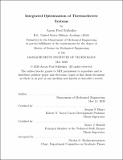| dc.contributor.advisor | Asegun S. Henry and Kasey J. Russell. | en_US |
| dc.contributor.author | Schlenker, Aaron Paul. | en_US |
| dc.contributor.other | Massachusetts Institute of Technology. Department of Mechanical Engineering. | en_US |
| dc.date.accessioned | 2020-09-03T17:47:48Z | |
| dc.date.available | 2020-09-03T17:47:48Z | |
| dc.date.copyright | 2020 | en_US |
| dc.date.issued | 2020 | en_US |
| dc.identifier.uri | https://hdl.handle.net/1721.1/127119 | |
| dc.description | Thesis: S.M., Massachusetts Institute of Technology, Department of Mechanical Engineering, May, 2020 | en_US |
| dc.description | Cataloged from the official PDF of thesis. | en_US |
| dc.description | Includes bibliographical references (pages 99-103). | en_US |
| dc.description.abstract | Thermoelectric devices present unique opportunities for sustainable energy conversion. While research efforts have remarkably improved material capabilities over the past several decades, material advancement alone is insufficient to realize the full potential of thermoelectric technology [25, 24, 39, 14]. Here, an integrated perspective is applied to thermoelectric technology to identify potential system improvements. The traditional thermoelectric architecture is dissected to identify limitations. It is found that the coupling of the device height to the thermoelectric element height imposed by the architecture can significantly hinder performance. A novel distributed architecture, which de-couples the device and element heights, is theorized to address these limitations. A modeling program incorporating device parameters and external conditions is developed to simulate and optimize the system architecture. The new architecture is shown to out-perform the traditional architecture in both a broad range of general generation and refrigeration conditions and the specific application of a phase-change material thermoelectric generator. The results signal the importance and potential value of an integrated approach to thermoelectric system design. | en_US |
| dc.description.statementofresponsibility | by Aaron Paul Schlenker. | en_US |
| dc.format.extent | 103 pages | en_US |
| dc.language.iso | eng | en_US |
| dc.publisher | Massachusetts Institute of Technology | en_US |
| dc.rights | MIT theses may be protected by copyright. Please reuse MIT thesis content according to the MIT Libraries Permissions Policy, which is available through the URL provided. | en_US |
| dc.rights.uri | http://dspace.mit.edu/handle/1721.1/7582 | en_US |
| dc.subject | Mechanical Engineering. | en_US |
| dc.title | Integrated optimization of thermoelectric systems | en_US |
| dc.type | Thesis | en_US |
| dc.description.degree | S.M. | en_US |
| dc.contributor.department | Massachusetts Institute of Technology. Department of Mechanical Engineering | en_US |
| dc.identifier.oclc | 1191836351 | en_US |
| dc.description.collection | S.M. Massachusetts Institute of Technology, Department of Mechanical Engineering | en_US |
| dspace.imported | 2020-09-03T17:47:48Z | en_US |
| mit.thesis.degree | Master | en_US |
| mit.thesis.department | MechE | en_US |
